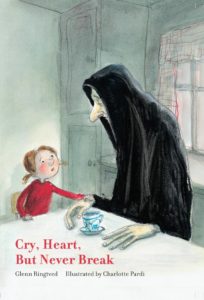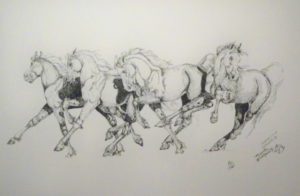The paradox of nonexistence and living.
August 10, 2017“Grief, when it comes, is nothing like we expect it to be.”
Maria Popova: We continue to grapple with the paradox of our mortality. But arguably our most formidable and intense confrontation with nonexistence comes when we lose loved ones. In ‘The Year of Magical Thinking”, her harrowing record of the year following the death of her husband of four decades, John Gregory Dunne, Joan Didion, born on December 5, 1934, offers a soul-stirring meditation on grief in all its unimaginable dimensions.
Joan Didion:
“Grief has no distance. Grief comes in waves, paroxysms, sudden apprehensions that weaken the knees and blind the eyes and obliterate the dailiness of life. Virtually everyone who has ever experienced grief mentions this phenomenon of “waves.”
Grief turns out to be a place none of us know until we reach it. We anticipate (we know) that someone close to us could die, but we do not look beyond the few days or weeks that immediately follow such an imagined death. We misconstrue the nature of even those few days or weeks. We might expect if the death is sudden to feel shock. We do not expect the shock to be obliterative, dislocating to both body and mind. We might expect that we will be prostrate, inconsolable, crazy with loss. […] In the version of grief we imagine, the model will be “healing.” A certain forward movement will prevail.
The worst days will be the earliest days. We imagine that the moment to most severely test us will be the funeral, after which this hypothetical healing will take place. When we anticipate the funeral we wonder about failing to “get through it,” rise to the occasion, exhibit the “strength” that invariably gets mentioned as the correct response to death. We anticipate needing to steel ourselves the for the moment: will I be able to greet people, will I be able to leave the scene, will I be able even to get dressed that day?
We have no way of knowing that this will not be the issue. We have no way of knowing that the funeral itself will be anodyne, a kind of narcotic regression in which we are wrapped in the care of others and the gravity and meaning of the occasion. Nor can we know ahead of the fact (and here lies the heart of the difference between grief as we imagine it and grief as it is) the unending absence that follows, the void, the very opposite of meaning, the relentless succession of moments during which we will confront the experience of meaninglessness itself.”
brainpickings.org
Musings of the random.
Random is the instant a horse at full speed has all four hooves off the ground.
It refers to the mystery of unbridled passion, to the lift that results from total immersion and surrender. In our age, however, random means without design, method, or purpose. It refers to utter chance. It helps us dismiss whatever appears to be beyond the control of our will. If we didn’t author it, it must be accidental.
Yet our lives are full of unexpected surges of kindness that seem to come from nowhere. Just when you’re thirsty, a cup is gathered and passed around. Just when you are lonely to the point of snapping that bone way inside that you show no one, someone offers you a ride or steadies the grocery bag about to drop from your grip. Just when you feel nothing can raise your sad head from the lonely road, the deer strutter across the road in exact rhythm with Handel.
For us, the moment at random is the moment of holding nothing back, of giving our all to whatever situation is before us. In that charged moment, we come as close to flying as human beings can – – we soar briefly with a passion for life that brings everything within us to meet our daily world.
We flow to each other’s aid, often without knowing where we are headed. Mysteriously, the life force heals itself this way. And what we call ‘chance’ or ‘luck’ or coincidence’ is the circulation of life healing itself through us and in us.
-Mark Nepo/’The Book of Awakening’ pp. 626-263
- Do one thing at random today.
- Hold nothing back. Allow what touches you to change your path.


